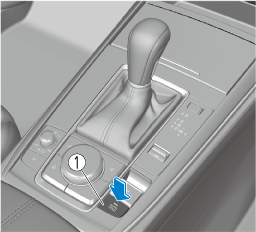

To Turn On AUTOHOLD System
Press the AUTOHOLD switch and when the AUTOHOLD standby indicator light turns on, the AUTOHOLD function turns on.

-
AUTOHOLD standby indicator light
When all of the following conditions are met, the AUTOHOLD standby indicator light turns on when the AUTOHOLD switch is pressed and the AUTOHOLD function turns on.
-
The ignition is switched ON (engine is running or stopped by i-stop).
-
The driver's seat belt is fastened.
-
The driver's door is closed.
-
There is no problem with the AUTOHOLD function.
To operate AUTOHOLD and hold the brakes
-
Depress the brake pedal and bring the vehicle to a complete stop.
-
The AUTOHOLD active indicator light in the instrument cluster turns on and the brakes are held.

-
The vehicle is held in its stopped position even with the brake pedal released.
When all of the following conditions are met, the AUTOHOLD operates and the brakes are held.
-
The ignition is switched ON (engine is running or stopped by i-stop).
-
The vehicle is stopped.
-
The brake pedal is being depressed.
-
The AUTOHOLD active indicator light turns on.
-
The accelerator pedal is not depressed.
-
The driver's seat belt is fastened.
-
The driver's door is closed.
-
There is no problem with the AUTOHOLD function.
-
The parking brake is released.
-
There is no problem with the Electric Parking Brake (EPB) function.
-
(Automatic transmission vehicle)
The selector lever is in a position other than R position or the vehicle tilts forward with the selector lever in the R position.
To release AUTOHOLD and start driving the vehicle
If you do any of the following actions to resume driving the vehicle, the brakes will be released automatically and the AUTOHOLD active indicator light turns off.
-
(Manual transmission vehicle)
You start to release the clutch pedal with the shift lever shifted to a position other than the neutral position
-
(Automatic transmission vehicle)
-
The accelerator pedal is depressed.
-
The vehicle tilts rearward or the selector lever is shifted to the R position on level ground.
-
-
If the Electric Parking Brake (EPB) switch is pulled while the AUTOHOLD is operating, the parking brake is applied and the AUTOHOLD is released. In addition, if the parking brake is released under this condition, the AUTOHOLD operates to hold the brakes.
-
Under the following conditions, the parking brake is automatically applied and the AUTOHOLD is released. The AUTOHOLD is re-enabled when the conditions before the AUTOHOLD is released are restored.
-
The driver’s seat belt is unfastened.
-
The driver’s door is opened.
-
-
When about 10 minutes or longer have passed since the AUTOHOLD operation started, the parking brake is automatically applied. Because the AUTOHOLD is restored when releasing the parking brake, the hold on the brakes by AUTOHOLD function resumes.
-
(Manual transmission vehicle)
When starting to drive the vehicle forward or in reverse on a down slope, depress the clutch pedal and shift the shift lever to the appropriate position for driving in the desired direction, and then depress the accelerator pedal to release the AUTOHOLD.
-
The AUTOHOLD can be cancelled forcibly by fully depressing the accelerator pedal for 1 second or longer while the AUTOHOLD is operating. Forcibly cancel the AUTOHOLD only when the AUTOHOLD cannot be cancelled due to a system malfunction or it is necessary to cancel the AUTOHOLD in an emergency.




